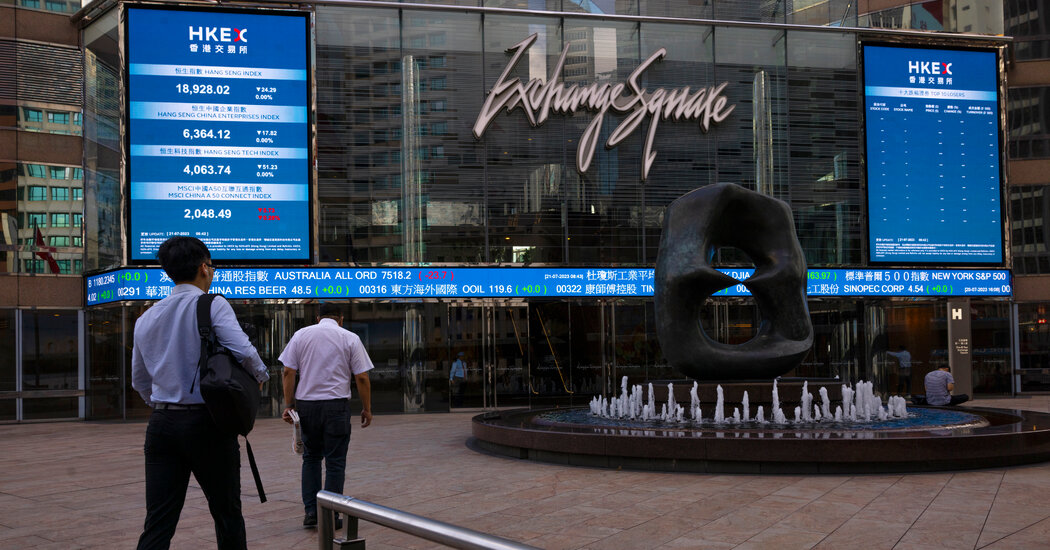Shares in Hong Kong entered a bear market on Friday, down 21 percent from their highs near the start of the year, as investors around the world grew increasingly concerned that the deteriorating state of China’s real estate sector could spill over into the broader economy.
The decline in the Hang Seng Index, which is made up mostly of mainland companies, comes as China’s economy grapples with weak growth. After three years of harsh Covid restrictions, foreign investment is down, consumers are spending less and the housing market is in turmoil.
Bear markets, when stocks are down at least 20 percent from their most recent peak, are a relatively rare sign that investors are viewing the economy with dangerous pessimism. The Hang Seng fell just over 2 percent on Friday, and about 6 percent for the week. The index is down more than 10 percent so far this month.
Global investors are also concerned about the effects of a weaker Chinese economy, which has heightened concerns about inflation and rising interest rates in Europe and the United States. On Friday, European stocks fell throughout the day and the S&P 500 lost about half a percent in early trading. The US benchmark is on track for a third straight weekly decline.
“Markets are taking a perfect storm,” analysts at Barclays wrote in a report on Friday, citing rising interest rates, gloomy economic data in China and other factors.
The real estate crisis is at the heart of concerns about China. Among the companies hit hardest recently is Chinese real estate giant Country Garden, whose shares are trading at less than one Hong Kong dollar. Another giant real estate developer, China Evergrande, filed for bankruptcy protection in the United States on Thursday as it struggles to settle with creditors over tens of billions of dollars in debt.
Highlighting the depths of the economic downturn, Soho China, the developer of Hong Kong-listed office buildings in mainland China, on Friday reported a first-half profit drop of more than 90 percent. The company said in a statement that “the domestic and global business environment remains full of uncertainty” and “market confidence has not yet been restored.”
Chinese stocks rebounded after officials in December lifted the government’s extreme “zero Covid” measures that severely curtailed economic activity. But hopes that the Chinese economy would show a sustainable recovery were dashed as the country released a series of worrying economic statistics. prices fell, increasing the risk of deflation; Retail sales and industrial production missed economists’ forecasts; Real estate investments dwindled.
Exports, the cornerstone of the Chinese economy, have plummeted. China’s currency, the renminbi, has fallen to its lowest level in years. A number of major banks have lowered their forecasts for how much the Chinese economy will grow in 2023, to levels below the government’s target of around 5%. The latest official figures indicate that China has been growing at an annual growth rate of about 3 percent.
Chinese policymakers responded with a series of measures aimed at encouraging consumers to spend more and banks to lend more. The central bank, the People’s Bank of China, has cut key interest rates to new lows, while securities regulators have proposed ways to make stock trading cheaper and easier. But the moves did little to boost investor confidence or generate greater economic activity.
One of the problems that weighs heavily on China is debt, particularly in local governments that rely heavily on the real estate market. China’s total debt is now greater, relative to national economic output, than in the United States.
And so the stock market lost steam. In Hong Kong, shares have fallen for six straight days, and eight of the past 10 trading sessions.
Shares in mainland China also fell. The CSI 300 index, which tracks the largest listed companies in Shanghai and Shenzhen, has fallen about 10 percent since its January high.
The situation for investors is brighter in the United States, where the S&P 500, even after recent declines, is up about 14 percent this year, buoyed by optimism about technology — particularly the prospects for artificial intelligence, and the chip makers who support those. Applications – and the elasticity of consumer spending.
However, the benchmark has lost about 5 percent of its value this month, pulling back from the gains recorded in recent months. “The US economy remains strong, while China continues to frustrate the sidelines, and global investors are becoming increasingly anxious,” Claudio Irigoyen, an economist at Bank of America, wrote in a report. He added that this “decoupling” could “taint the emotions” enough to cause a sharp decline in global markets.
Edward Moreno Contribute to the preparation of reports.
